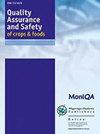Ruscogenin alleviates cognitive dysfunction by inhibiting the activation of isoflurane-induced NLRP3 inflammasome in aged mice
IF 5.3
3区 农林科学
Q1 FOOD SCIENCE & TECHNOLOGY
引用次数: 0
Abstract
Ruscogenin exerts an anti-inflammatory effect in the pathogenesis of various human diseases, including pulmonary hypertension, acute lung injury, acute pancreatitis and cerebral ischemia. Its role in isoflurane-induced rats with postoperative cognitive dysfunction (POCD) was investigated in this study. Aged rats were exposed to isoflurane for establishing a model of POCD, and administered with ruscogenin by gavage. Cognitive dysfunction was evaluated by the Morris water maze test. Hematoxylin and Eosin (H&E) staining was designed to assess neuronal damage. Markers of brain damage and neuroinflammation were detected by enzyme-linked-immunosorbent serologic assay. Isoflurane exposure caused impaired cognitive function by increasing escape latency, decreasing the time taken for crossing target and time in target quadrant. However, administration of ruscogenin reversed these cognitive dysfunctions. Abnormal morphological phenomena on neurons and enhanced levels of serum calcium-binding protein β (S-100β) and neuron-specific enolase (NSE) were identified in mice post-isoflurane exposure. Administration of ruscogenin ameliorated the neuronal morphological damages and reduced the levels of S-100β and NSE in the hippocampi of isoflurane-induced aged mice. Ruscogenin also attenuated isoflurane-induced enhancements in the levels of Interleukin (IL)-1β, IL-6 and tumor necrosis factor-alpha in the hippocampi of mice. Isoflurane-induced enhancements in the mRNA expression levels of NLR family pyrin domain containing 3 (NLRP3), ASC, IL-1β and IL-18 proteins were also restored by administration of ruscogenin. Ruscogenin exerted neuroprotective effects against isoflurane-induced cognitive dysfunction and neuroinflammation through blocking of NLRP3 pathway.Ruscogenin通过抑制异氟醚诱导的老年小鼠NLRP3炎性体的激活来减轻认知功能障碍
Ruscococin在各种人类疾病的发病机制中发挥抗炎作用,包括肺动脉高压、急性肺损伤、急性胰腺炎和脑缺血。本研究探讨了其在异氟烷诱导的术后认知功能障碍(POCD)大鼠中的作用。将老龄大鼠暴露于异氟烷以建立POCD模型,并通过灌胃给予ruscocin。认知功能障碍通过Morris水迷宫测试进行评估。苏木精和曙红(H&E)染色用于评估神经元损伤。用酶联免疫吸附血清学方法检测脑损伤和神经炎症标志物。异氟烷暴露通过增加逃逸潜伏期、减少穿越目标所需时间和进入目标象限的时间而导致认知功能受损。然而,服用ruscocin逆转了这些认知功能障碍。异氟烷暴露后,小鼠的神经元出现异常形态学现象,血清钙结合蛋白β(S-100β)和神经元特异性烯醇化酶(NSE)水平升高。Ruscococoin可改善异氟烷诱导的衰老小鼠海马神经元形态学损伤,降低S-100β和NSE水平。Ruscocin还减弱了异氟烷诱导的小鼠海马白细胞介素(IL)-1β、IL-6和肿瘤坏死因子α水平的增强。异氟醚诱导的NLR家族pyrin结构域3(NLRP3)、ASC、IL-1β和IL-18蛋白的mRNA表达水平的增强也通过给予ruscocin而恢复。Ruscocin通过阻断NLRP3通路对异氟烷诱导的认知功能障碍和神经炎症发挥神经保护作用。
本文章由计算机程序翻译,如有差异,请以英文原文为准。
求助全文
约1分钟内获得全文
求助全文
来源期刊

Quality Assurance and Safety of Crops & Foods
FOOD SCIENCE & TECHNOLOGY-
CiteScore
4.60
自引率
7.50%
发文量
61
审稿时长
1 months
期刊介绍:
''Quality Assurance and Safety of Crops & Foods'' is an international peer-reviewed journal publishing research and review papers associated with the quality and safety of food and food sources including cereals, grains, oilseeds, fruits, root crops and animal sources. It targets both primary materials and their conversion to human foods. There is a strong focus on the development and application of new analytical tools and their potential for quality assessment, assurance, control and safety. The scope includes issues of risk assessment, traceability, authenticity, food security and socio-economic impacts. Manuscripts presenting novel data and information that are likely to significantly contribute to scientific knowledge in areas of food quality and safety will be considered.
''Quality Assurance and Safety of Crops & Foods'' provides a forum for all those working in the specialist field of food quality and safety to report on the progress and outcomes of their research.
 求助内容:
求助内容: 应助结果提醒方式:
应助结果提醒方式:


